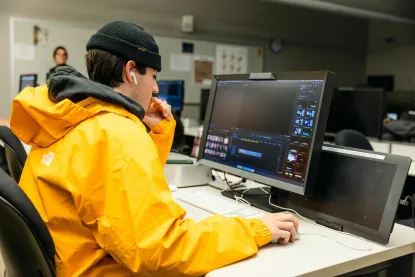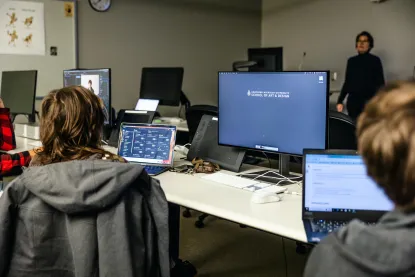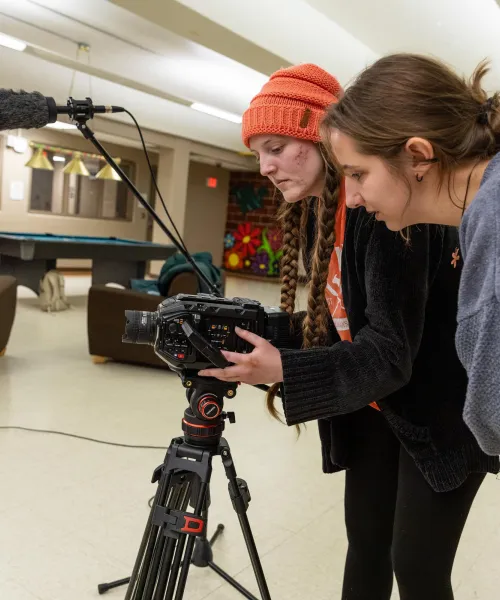Quick Links

About the Program
The Digital Cinema program at Northern Michigan University gives students hands-on experience in all stages of filmmaking and invites students to pursue their own varied interests, including fiction, nonfiction, and experimental forms.
Students have access to digital cameras, lighting, and sound equipment, camera rigging, and accessories. Students work in state-of-the-art production and post-production facilities. Studios are open approximately 80 hours per week. Students also produce video work on their University-distributed MacBook Pro laptops with the Adobe Suite pre-installed.
Graduates find careers in feature film and television production, marketing and advertising, broadcasting, event documentation, education, and independent filmmaking.
ARTD 212 Digital Cinema: Foundations
4 credit hours
Offered: Fall, Winter
Introduction to the concepts and practices of digital filmmaking, exploring fiction, documentary, and experimental video production. Focuses on foundational approaches to filming and editing short-form cinematic works.
AD 312 Digital Cinema: Advanced Production
4 credit hours
Offered: Winter
Prerequisite: AD/ARD 212 or BC 250, or instructor permission.
Development of the concepts and practices of digital filmmaking, exploring fiction, documentary, and experimental video production. Focuses on advanced approaches to filming and editing short-form cinematic work,s emphasizing cinematography, post-production, and collaboration.
AD 448A Digital Cinema: Documentary Filmmaking
4 credit hours
Offered: Fall, odd-numbered years
Prerequisite: AD 312 or instructor permission.
Continued development of the concepts and practices of digital filmmaking, emphasizing documentary film production. Focuses on producing short-form cinematic works exploring various documentary modes, historical approaches, and ethics of representation.
AD 448B Digital Cinema: Fiction Filmmaking
4 credit hours
Offered: Fall, even-numbered years
Prerequisite: AD 312 or instructor permission.
Continued development of the concepts and practices of digital filmmaking, emphasizing fiction film production. Focuses on producing short-form cinematic works exploring narrative structure, character development, and visual storytelling.
AD 449 Digital Cinema: Professional Practice
4 credit hours
Offered: Winter
Prerequisite: AD 303 and either AD 448A or 448B, or instructor permission.
Continued development of the concepts and practices of digital filmmaking, emphasizing the development, production, and realization of a capstone project. Focuses on professional production practices and career development.

Computer Studio
Digital Cinema students use University-issued MacBook Pros and the shared Art & Design Computer Studio, which features Apple workstations with large displays and industry-standard software, including Adobe Premiere Pro, After Effects, DaVinci Resolve, and Final Cut Pro.
Students can borrow cameras, lenses, rigging gear, and lighting and sound equipment, with advanced students gaining access to higher-end gear such as Blackmagic URSA cameras. The program also includes a Digital Lighting Studio with a Kinoflow lighting system, three stages including a green screen, and a newly upgraded Color Suite with DaVinci Resolve and a professional Blackmagic Color Panel for color grading.
Studios and equipment are available approximately 75 hours per week outside of class. Courses also use a theater-style classroom for lectures, film screenings, and student critiques.
Digital Cinema FAQ
The Bachelor of Fine Arts (BFA) in Digital Cinema is a professional studio degree focused on intensive, hands-on filmmaking training. It includes coursework in related areas such as Graphic Design, Photography, Electronic Imaging, Media Production, Film Studies, and Theatre & Dance. This path is ideal for students pursuing careers in the creative industries, including directing, editing, and cinematography.
The Bachelor of Arts (BA) and Bachelor of Science (BS) offer greater flexibility, making them well-suited for students who want to combine Digital Cinema with another field of study or pursue a minor, such as Music, Creative Writing, or Business. The BA includes a world language requirement, while the BS does not.
If you are accepted to the university, you may pursue a degree within the School of Art & Design. A portfolio review is not required for admission; however, all Art and Design majors must complete a faculty review of their work through AD303: Individual Art Review. The review is held in the twelfth week of each semester after students complete the foundation prerequisites and at least three Digital Cinema courses.
For information on general University admission requirements, contact the Admissions Office.
Digital Cinema majors are not required to own personal filmmaking equipment. All projects are completed using professional gear and facilities provided by the School of Art & Design.
Each Art & Design major receives an Apple MacBook with Adobe Creative Suite, allowing them to edit projects on their laptops. Students enrolled in Digital Cinema courses have access to a wide range of production equipment–including digital cinema cameras, lenses, rigging gear, lighting, and professional sound equipment–through the School’s equipment checkout system. Advanced students gain access to higher-end tools, such as the Blackmagic URSA camera systems.
Students also benefit from access to:
- A state-of-the-art lighting studio with a chromakey (green screen) stage
- Post-production suites with high-end computers and industry-standard software for editing, color grading, and visual effects
Aside from an initial investment in personal media storage, most students spend under $100 per semester on course supplies, depending on the scope of their projects.
A degree in Digital Cinema prepares students for a wide range of careers in the film, television, and media industries. Graduates may pursue roles such as director, cinematographer, editor, screenwriter, sound designer, or producer. Many also find work in related fields like advertising, marketing, social media content creation, and education.
While the film industry is competitive, students gain hands-on experience, build strong portfolios, and graduate with a network of collaborators and alumni. The curriculum emphasizes storytelling, creative problem-solving, and visual communication skills that are highly valued across many creative and tech-forward industries.
In their final year, students take AD449: Professional Practice, a course focused on career development and capstone projects, helping them transition confidently into the professional world.
Yes. The majority of students who pursue careers in Digital Cinema find success in areas such as feature film and television production, marketing and advertising, broadcasting, event documentation, education, and independent filmmaking. Graduates work across the U.S., from Los Angeles to New York City, and some go on to pursue graduate studies.
Internship opportunities in Marquette are growing, and completing an internship before graduation increases employment prospects. Students are also encouraged to join the 4Reels Digital Cinema Club to expand their professional network.
Advanced courses help students develop resumes, reels, and portfolio websites, ensuring they’re prepared to begin the job search before graduation.
The Digital Cinema program emphasizes conceptual clarity, storytelling, and collaboration at every stage of the filmmaking process. Students are encouraged to develop original, meaningful ideas and bring them to life using strong visual and narrative techniques. While technical skills are essential, the core focus is always on producing intentional, understandable, and impactful work.
The curriculum offers a comprehensive filmmaking experience, including:
- Pre-production: storyboarding, screenwriting, art direction
- Production: directing, cinematography, sound design, collaboration
- Post-production: editing, sound mixing, color grading, visual effects
Courses such as AD212 (Foundations) and AD312 (Advanced Production) build foundational and intermediate skills. In the 400-level courses (AD448A and AD448B), students explore both documentary and fiction filmmaking, leading to a capstone project and professional development in AD499: Professional Practice.
Yes, the Digital Cinema curriculum includes Art and Design elective credits, giving you flexibility to explore other creative areas. All 200-level studio courses are open to any student and require no prerequisites.
Be sure to consult with your advisor or faculty mentor to select electives that align with your interests and academic goals.
For information about scholarships for incoming freshmen, please visit the Scholarships & Financial Aid page.
